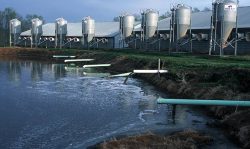CAFOs stink. In addition to being crowded, dirty, inhumane, and brimming with antibiotic-resistant bacteria, CAFOs, or concentrated animal feeding operations, produce thousands of gallons of liquid waste with a stench that wafts through the air in the surrounding communities practically daily.
These odors are nasty and hard to live with, but new science suggests they also might put the bodies of those living near them in a state of stress that could have frightening effects on their blood pressure.
A study released last week out of the University of North Carolina-Chapel Hill, and published in Environmental Health Perspectives, asked 101 residents of towns in close proximity to large, industrial swine operations to sit outdoors for 10 minutes a day and record the level of hog odor on a 9-point scale. Then they were also asked to measure their blood pressure twice on portable digital devices. As a result, the researchers found a strong correlation between the days when the subjects reported strong odors and regular stress-induced blood pressure spikes.
The study’s lead researcher, Steve Wing, has already looked into some of the more well-known downsides to living near a CAFO. Last year, he released a related study finding that North Carolina residents who live in areas near big hog farms experienced eye irritation, wheezing, chest tightness, shortness of breath, sore throats, and nausea.

Jeff VanugamA CAFO manure lagoon.
And while those experiences are important (and truly awful to live with on a regular basis), they must all be self-identified by the study’s subjects, while this new science shows what Wing describes as “a physiologic change that can be measured and is independent of their perception.”
Regular spikes in one’s blood pressure can lead to hypertension, and while the study did not measure hypertension in and of itself, Wing says he sees the blood pressure spikes as problematic on their own.
“What’s very well known is that the risk of stroke and heart disease and other serious and fatal problems rises as blood pressure rises,” he says.
Of course residents in the area studied may face these health challenges for other reasons (such as diet, lifestyle, heredity, etc.), and these findings only apply to 101 people. That said, they’re still fairly significant.
Wing adds: “It’s not something that’s purely aesthetic; it’s not something that’s restricted to perception and behavior. It actually translates into a biological change that has medical significance. And if the same thing is going on with people all over the country who live near CAFOs, then [high blood pressure in nearby residents]is one of the consequences of industrial food production. The meat supply is dominated by CAFO production worldwide. So this might be one of the casualties of producing meat in this way.”
The study also has larger implications.
“There are other types of malodors that impact stress and quality of life,” says Wing. “That’s part of the larger picture of environmental justice.” In other words, this science could apply in other places where large quantities of gas, plastics, resins, or other strong-smelling industrial products are made or transported.
Other research has touched on the correlation between noise levels and blood pressure, but this is one of the first times stress and its physical effects have been studied in relation to odor.
Wing met a number of people living near CAFOs — many of them too disenfranchised to relocate — and he was motivated to begin documenting what he heard from them. It’s worth noting, the scientist adds, that nothing he and his team are studying is illegal. “The CAFOs in this study all hold permits from the government to operate and use the practices they use to pollute their neighborhoods.”
Of course, the fact that such research is necessary in the first place can be discouraging. “In one sense, we shouldn’t have to do studies like this,” says Wing. “People who live near CAFOs are being exposed to fecal waste through air and water, and we know it’s affecting their quality of life. That should be enough.”
And until that knowledge is enough to change the state of modern farming, it’s good to know there are people willing to stick their noses out — literally — to get the facts.
Bonus: Blogger and Superbug author Maryn McKenna live-tweeted a presentation by Wing at the recent conference of the National Association of Science Writers. See it Storified here.




